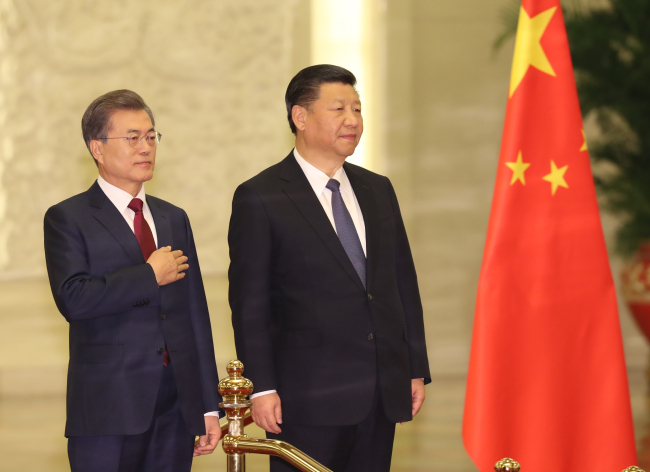‘Moon-Xi summit showed willingness to mend strained ties’
By Jung Min-kyungPublished : Dec. 15, 2017 - 15:59
The outcome of the latest summit between the leaders of South Korea and China embodies the two nations’ willingness to work on their differences over the deployment of the THAAD anti-missile system here and reaffirm their cooperation on North Korean issues, an expert said.

“President Xi avoided directly referring to THAAD and was cautious in addressing the issue in meetings, which could indicate that China has taken a step towards recovering bilateral ties with South Korea,” Min Jeong-hun, a professor at Korea National Diplomatic Academy in Seoul, told The Korea Herald on Friday.
Min’s thoughts are in line with a senior Cheong Wa Dae official’s remarks released the same day saying that the summit between President Moon Jae-in and his Chinese counterpart Xi Jinping was a “good signal” that the two nations are getting off to a fresh start in their relationship.
“During the expanded summit, President Xi referred to THAAD only as ‘an issue that we all know,’ rather than directly using the term ‘THAAD.’ The term was briefly mentioned only at the one-on-one meeting at the end,” the official said, comparing Xi’s subtle shift in tone from the previous summit on the sidelines of the Asia-Pacific Economic Cooperation forum last month.
“I think it‘s a good signal,” the official added.
Xi had brought up the issue of the Terminal High Altitude Area Defense system at the meeting in Danang, Vietnam, despite Cheong Wa Dae’s previous statements that the issue would not be discussed.
Min also noted Xi’s refrain from pushing South Korea to respond to its “three no’s” policy -- no additional THAAD deployments, no joining of a broader US missile defense system and no military alliance among South Korea, the US and Japan.
Moon’s state visit to Beijing came at a sensitive time with the two nations struggling to move past Seoul’s decision to install THAAD here and China’s economic retaliation that followed.
China claims that THAAD’s powerful radar could be used to spy on its military facilities. Seoul has repeatedly stated that the system will only be used defend against North Korea’s threats.
On North Korean issues, the new agreement drawn by the two leaders drew mixed reactions with the opposition parties claiming claimed that the move underscored the threat of North Korea’s nuclear program.
“Although there is nothing really ‘new’ about the ‘four principles’ it is a reiteration of their previous vows to cooperate on North Korean issues,” Min said.
The “four principles” in dealing with North Korea’s nuclear issues are -- no tolerance for war, a firm resolve to denuclearize the Korean Peninsula, resolution of related issues through dialogue and negotiations and improving inter-Korean relations is beneficial to resolving issues on the peninsula.
“The ‘four principles’ which is not a joint statement nor a joint conference, is an agreement that shows the current administration’s complacent view toward the threat of North Korea’s nuclear program,” said Chang Je-won, a spokesperson for the main opposition Liberty Korea Party.
“When the North may already have nuclear arms, their mention of the principle of the denuclearization of the Korean Peninsula, after all, amounts to pardoning the North for its possession of nuclear arms.”
But Min highlighted the existing difference in South Korea and China’s thoughts on several issue including THAAD, saying it would be meaningless to release such a document under such circumstances.
“A gap continues to exist between South Korea and China’s stances on several issues including THAAD, so the best option was to announce the results through separate statements,” he said.
Min listed restoration of trust between Seoul and Beijing, North Korea’s nuclear issues and bilateral economic cooperation between the two nations as major keywords on President Moon’s agenda throughout his state visit.
By Jung Min-kyung (mkjung@heraldcorp.com)




![[Herald Interview] 'Amid aging population, Korea to invite more young professionals from overseas'](http://res.heraldm.com/phpwas/restmb_idxmake.php?idx=644&simg=/content/image/2024/04/24/20240424050844_0.jpg&u=20240424200058)













![[KH Explains] Korean shipbuilding stocks rally: Real growth or bubble?](http://res.heraldm.com/phpwas/restmb_idxmake.php?idx=652&simg=/content/image/2024/04/25/20240425050656_0.jpg&u=)

